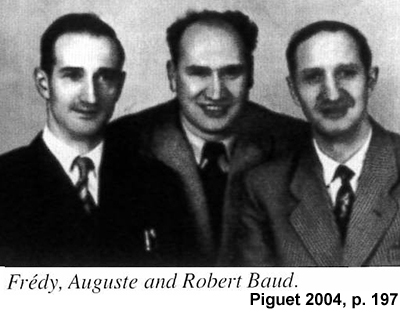|
The BAUDS (L´Auberson) Auguste Baud-Gonthier (1874–1940) Auguste Baud jun. (1924–) Frédy Baud (1904–1998) Robert Baud (1917–) Auguste Baud-Gonthier (1874–1940) “Auguste Baud-Gonthier established himself in 1896. He repaired and assembled music boxes. Like so man others, he had been strongly influenced by the precision of the work carried out by his father, Emile, who was a watchmaker for the La Chaux-de-Fonds watchmaking companies. Auguste decided to learn everything there was to know about music boxes. He wanted to specalize in repairs and to acquire some form of independence in order to take over the paternal domain in due course. He went to work in Geneva für Billon, the comb manufacturer, in Bern for Heller with whom he kept regular contact, and then in Berlin where he worked for Louis Jaccard, who represented Junod and Aubert from Sainte-Croix in Germany. He spent two years in the capital of the Reich, in 1894 and 1895, at a time when the Leipzig industries produced the revolutionary disc-playing music boxes causing so much upset in Sainte-Croix.” “In 1896 Auguste Baud sen. returned to L´Auberson. He was twenty-two years old, he had a small holding to work on, valuable experience in assembly and repairs, and no dependents. But soon the first consequences of the competition of the German disc boxes were making themselves felt, work became scarce and this led to falling wages and the constitution of trade unions. He was one of the first workers in the home industry to sign up for the Music Box Workers´ Society on 31st May 1897. He was a member of the assemblers section, of which he became chairman and in this capacity he participated, like the other music box workers, in the movement in favor of wage increases in 1919.” “The war years were particularly hard on the workers, expecially Auguste Baud, who married in 1913 and who had [three] sons, Frédy, born in 1915 and Robert, born in 1917, [and] Auguste junior, [...] born in 1924, [...]” “The elder brother, Frédy, was fortunate enough to train at the local School of Precision Mechanics, after which he went to work at the Hermann Thorens factory. Here he was not really enamored with the mass production. So he changed and worked for a company making the Borca bicycles.” “Auguste Baud died in 1940, leaving a lot of responsibility to his eldest son. Newly married, Frédy had three children to feed, he took care of his mother, and all this in an economic climate seriously perturbed by the war.” Baud Frères SA (1940–?)
“For six years Frédy and Auguste Baud jun. somehow carried on the local family business, and in 1946, with their younger brother Robert, they founded Baud Frères SA. They took advantage of the tremendous postwar industrial boom and the record orders for music boxes destined for the American market. They signed a contract for the supply of 10,000 small music boxes per month for Reuge SA, who provides them with the materials, leaving it to the Baud brothers to assemble and dispatch. Guido Reuge passed large orders of assembly work to the Baud brothers in L´Auberson and proposed a similar contract to Matthey. The work consisted of assembling unmarked eighteen-note musical movements on the basis of components supplied by Reuge. They continued with their repair work, which was again in demand after the war. They had fifty years of experience in the field and they had acquired a number of music boxes which they restored morning, noon and night, building up a capital of musical and mechanical treasures. Apparently people began to hear about it, for in 1953 Frédy Baud was contacted by Jelmoli, who was interested in organizing an exhibition of music boxes in their large departement store in Zurich. [Jelmoli today still exists as a mail-order firm]
The Baud museum was “[…] The name of the Baud Museum was, of all the companies existing in 1996, the best known in the world. Reuge as creator and manufacturer, Baud as curator and living memory of the music box and automata world.” History of the museum. It was in a home environment balanced by both farming and craftsmanship that three brothers were born and raised: Frédy born in 1915, Robert in 1917, and Auguste in 1924. In 1946, in addition to their farming business, the brothers formed an association and in 1956 they began restoring antique music boxes. Then on October 2, 1955 a long-time dream became a reality with the opening of their museum. (http://www.museebaud.ch/histoire.php?langue=en) At this first exhibition, Frédy Baud became acquainted with Alfred Chapuis, the historian from Neuchȃtel, from whom the Geneva Watch and Jewelry Society had commissioned a book on music boxes fort he exhibition to be put in Geneva in 1955. The two men worked closely together and this cooperation gave rise to an excellent book.” “In September 1995, on the occasion of the fortieth anniversary of the Baud Museum, Frèdy announced that Arlette Rustichelli-Baud and Michel Bourgoz would be suceeding him and that the family collection would be kept in L´Auberson. Frèdy Baud did not live to see the last of the changes. On 12th December 1998, in his 84th year, he died suddenly. ” http://www.museebaud.ch/histoire.php?langue=en Baud Frères, St. Croix, modern repairer and resterer of musical movements. (Ord-Hume, Musical Boxes, p. 293) 2018 sucht die CIMA-Stiftung nach Mitteln, um die Baud-Sammlung zu kaufen, damit sie in der Region bleibt.
|

